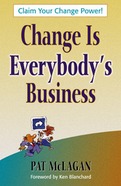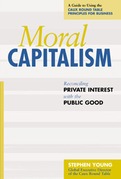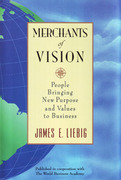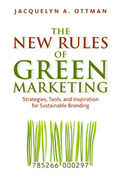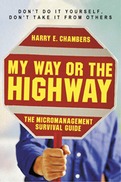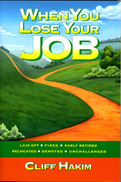2003
- Shows how to ensure that capitalism promotes progress and equality rather than enriching the few at the expense of many
- Based on principles developed by the Caux Round Table, an international network of senior business executives from such companies as 3M, Canon, NEC, Bankers Trust, Shell, Prudential, and dozens of other companies
- Provides practical guidelines for corporate social responsibility through the Caux Round Table's Seven General Principles for Business
1994
In our time of dramatic worldwide change, can business leaders meet the challenges of the marketplace and the needs of people, communities, and the planet? Merchants of Vision profiles 40 business leaders who are successfully working to do just that.
James Liebig interviewed dozens of business women and men in 70 organizations from 14 countries. He found executives, entrepreneurs, CEOs, and consultants who recognize business's pervasive global influence and have found ways to use that influence to affect positive change in people's lives and meaningful growth in their businesses. In Merchants of Vision they share their beliefs, experiences, and creative actions.
Visionary yet down-to-earth, these real-life portraits provide viable business strategies for:
o enhancing social equity,
o protecting the natural environment,
o fostering human creativity,
o serving higher purposes, including spiritual, service, and community values,
o behaving ethically,
o providing transformational leadership.
Representing a variety of business enterprises in the United States, Latin America, Europe, and Asia, innovators profiled include, for example:
o Elliot Hoffman, president of Just Desserts in San Francisco;
o Jacqueline Cambata, president of Phoenix Chemical in Virginia;
o Mara Adela Palcos, director of Rio Abierto Institute in Buenos Aires;
o Marjorie Kelly, editor and publisher of Business Ethics magazine;
o Eckart J. Wintzen, president of BSO/ORIGIN, computer custom software services in The Netherlands;
o Joe Jaworski, head, Business Environment Section, Shell International Petroleum Co. Ltd., in London, England;
o Jagdish Parikh, managing director, Lemuir Group of Companies in Bombay, India;
o Carol Frenier, president, The Advantage Group, Inc., specialty advertising in Vermont;
o Meryem Le Saget, directeur, Institut de L'Expansion, Group Expansion, business seminars and conferences in Paris, France;
o Heini Lippuner, chairman, executive committee, Ciba-Geigy Limited, chemical manufacturing in Basel, Switzerland;
o Robert V. Adams, president of Xerox Technology Ventures in California.
These are people of action and integrity who sustain themselves with the creative friction between their idealism and their knowledge of the real world. Their experiences-addressing issues of personal responsibility and product quality, expanding markets and shrinking natural resources, technological advancement and cultural preservation-reveal ways businesses must adapt to survive, thrive, innovate, and lead.
- Published in cooperation with the World Business Academy, an international network of progressive business leaders committed to using their business expertise to make a positive difference in the world
- Practical and inspiring portraits of 40 business men and women "walking their talk" by integrating their ideals in the world of commerce
Drawing on the latest poll data and incorporating lessons learned from her clients and other leading sustainable brands -- including GE, Nike, Method, Starbucks, Timberland, HP, NatureWorks, Procter & Gamble, Stonyfield Farm, and Wal-Mart -- Ottman provides practical strategies, tools, and inspiration for building every aspect of a credible value-based green marketing strategy. She covers such topics as spurring innovation through a proactive approach to sustainability, developing products that are green throughout their life cycle, communicating credibly to avoid accusations of "greenwashing," teaming up with stakeholders to maximize outreach to consumers, taking advantage of social media, and much more.
The New Rules of Green Marketing captures the best of Ottman's two previous groundbreaking books on green marketing and places it within a 21st Century context. Focusing on a new generation of marketers who likely grew up with an appreciation for sustainability, it provides in one place essential strategies, tools, and inspiration for connecting effectively with mainstream consumers.
-
By a trailblazing expert in green marketing
-
Demonstrates how to effectively market green to mainstream consumers
-
Filled with success stories from sustainability leader including Ottman's Fortune 500 and entrepreneurial clients
- Click Here for Press Release
Green products have been around since the 1970s, but it's only in recent years that they've become ubiquitous. That's because savvy green marketers are no longer targeting "deep green" consumers with a "save the planet" pitch. Instead, they're promoting the added value their products provide: better health, superior performance, good taste, or cost-effectiveness. In this innovative book Ottman argues that emphasizing primary benefits -- the New Rules -- is critical to winning over the mainstream consumer.
Drawing on the latest poll data and incorporating lessons learned from her clients and other leading sustainable brands -- including GE, Nike, Method, Starbucks, Timberland, HP, NatureWorks, Procter & Gamble, Stonyfield Farm, and Wal-Mart -- Ottman provides practical strategies, tools, and inspiration for building every aspect of a credible value-based green marketing strategy. She covers such topics as spurring innovation through a proactive approach to sustainability, developing products that are green throughout their life cycle, communicating credibly to avoid accusations of "greenwashing," teaming up with stakeholders to maximize outreach to consumers, taking advantage of social media, and much more.
The New Rules of Green Marketing captures the best of Ottman's two previous groundbreaking books on green marketing and places it within a 21st Century context. Focusing on a new generation of marketers who likely grew up with an appreciation for sustainability, it provides in one place essential strategies, tools, and inspiration for connecting effectively with mainstream consumers.
- By the author of the bestselling Bad Attitude Survival Guide (more than 40,000 copies sold), named one of the top business books of 1998 by Executive Book Summaries
- Everyone thinks they know what micromanagement is, but this book presents a specific, detailed definition illustrated with concrete examples
- Offers successful strategies for overcoming your own micromanaging behavior and for responding when you are being micromanaged
Unlike other career books, When You Lose Your Job is written in the style of a story, telling a personal, revealing account of an individual's shock, fears, struggles, self-renewal, learnings, and eventual successes over many months in recovering from job loss. The story offers an inside view of what to expect in dealing with job loss, how to find the support you need, and how to take the steps that will lead to meaningful work.
Interspersed in the story are many practical career transition tools (such as guidelines for networking and interviewing). The book also includes a 65-page resource section that offers detailed information on legal issues, severance agreements, unemployment benefits, who to go to for help, support groups, and much more.
This booklet gives an overview of the Search Conference, a change strategy which uses open systems principles in strategic planning, thereby creating a well-articulated, achievable future with identifiable goals, a timetable, and action plans for realizing that future.


